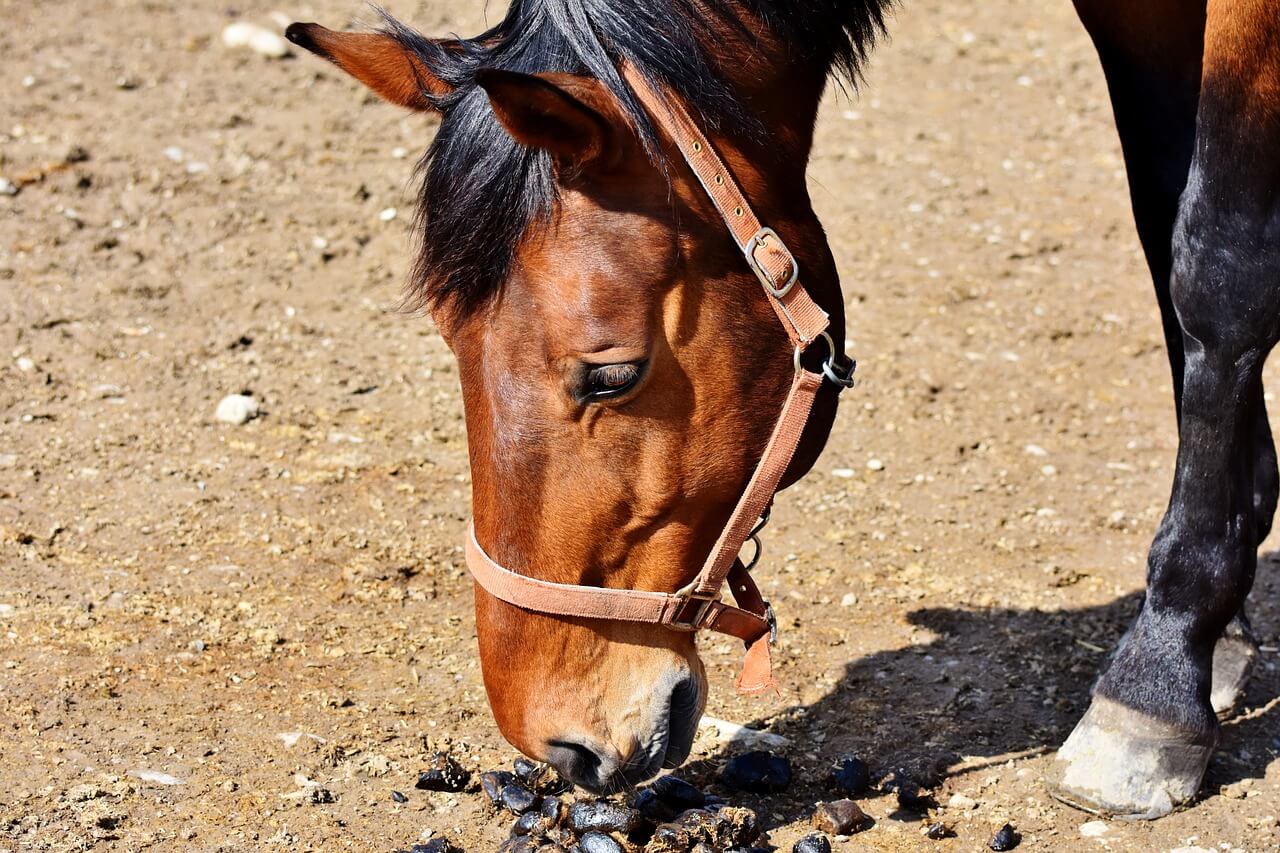
To humans, it is disgusting when animals (such as dogs and horses) eat poop – whether it be their own or another animal’s feces.
Coprophagy (kopros from the Greek for feces, and phagein which is Greek for eating) is not the same as pica that is eating dirt, twigs, sand, and other non-foods.
Foals
Some foals, from when they are born until when about they are 2 months old, do eat their own or their mother’s (the mare’s) manure.
Veterinarians have a variety of reasons for why this occurs. It could be that foals eat manure to get “good bacteria” to help them digest food; or it could be because they need to ingest eggs of parasites to help start their immune system; or, the foal could be testing out what they do and don’t like to eat.
Some veterinarians recommend that you add a probiotic to your filly or colt’s food to help them build good bacteria.
Why They Are Eating It?
So why do horses eat poop? Horses are meant to eat – to graze – all day long every single day.
As domesticated animals, we tend to keep our horses in stalls that allow them to move around and lay down, but it does not provide them with large outdoor space needed to move and eat freely.
Horses that are bored or hungry may try to satisfy these feelings by either eating their poop or cribbing on wood.
Eating manure may also be a sign of a nutrient deficiency.
How Do You Stop It?
So, how do you stop this behavior? First, work with an equine nutritionist or a veterinarian who has this expertise to determine what, if any, nutrients are missing from your horse’s diet (minerals, vitamins, proteins, or something else).
By going through this process you will be able to determine if your horse’s current diet is sufficient or requires adjusting. Your horse’s age and activity level, in addition to its current diet, will be a part of this process.
There are several other activities that must become a regular part of horse care once your horse is eating the right diet.
- Note that a horse’s diet needs to be supplemented with grain and the appropriate nutrients in addition to a diet of grass and hay.
- Make sure horse is on a regular worming schedule. Work with your veterinarian to set-up and maintain the schedule.
- You also want to have an equine dentist check and float your horse’s teeth once or twice a year. Floating involves taking a rasp designed to file down teeth so that they have smooth surfaces. This allows the horse to grind their food properly, getting the most nutrients out of what they eat. A dental check will also determine if your horse requires any teeth that need to be pulled.
- Keep a mineral salt block available at all times in your horse’s stall and/or out in the corral or pasture where they spend most of their time. Salt blocks are made from different types of minerals and are available in different sizes. There are salt blocks you can hang in your horse’s stall and large salt blocks you can place on the ground in the pasture or corral.
- Keep stalls, run-outs, corrals, arenas, and any area where your horse spends time clean from manure. Daily cleaning of stalls is a necessity. It is also a good idea to have a muck bucket and pitchfork with closely aligned tines handy at all times, such as in the grooming stall, near stalls, and in the corner of the arena, corral, and pasture.
- Provide your horse hay at all times. Even hanging hay in a hay net directly outside your horse’s stall door helps feeding and allows your horse to see what is going on around them.
- Feed horses several times throughout the day, not just two times a day. Horses need to have food in their digestive system at all times, so it is better to feed them several times throughout the day.
- Clean water must be available to your horse at all times. It is very important to check your horse’s water supply several times a day to make that they have not pooped in their bucket, that the water is not dirty, that they have water, and that the water is not frozen.
- Horses thrive on routine, so make sure to feed, train, and turn out your horse the same time every day.
- Like being trapped in a cell, horses that live in stalls need to get out on pasture as well as get plenty of exercise. Being confined in a stall too long may result in your horse exhibiting behaviors such as weaving (moving from side-to-side) or eating manure from stress. Exercising, grazing outdoors, and eating a balanced diet significantly reduces coprophagy.
Diet
Common additions that are added to a horse’s diet, once it is determined what is missing in your horse’s diet, are adding multi-vitamin and/or mineral supplements, and/or fortified grain.
The veterinarian may suggest adding a probiotic to their diet to help them add good bacteria into their digestive tract again.
Overweight Horses
To address the issue of overweight horses who eat manure, attach a “slow feeder” to their halter. This allows them to eat, but to eat at a much slower rate.
If a horse is underweight or overweight, is lethargic, or behaving in ways that are not normal for them, you need to have them examined by a veterinarian.
Malnutrition
Horse coprophagy is not only disgusting; it is most often a result of something missing from your horse’s diet and/or a result of stress or boredom. It is an affliction that, once identified, should be addressed immediately.
The sooner your horse’s poop eating is stopped, the sooner they will return to being a healthy member of your family.
Check out our catalog of supplements, salt blocks, muck buckets and pitchforks, and everything else to make sure that your horse remains happy and healthy!



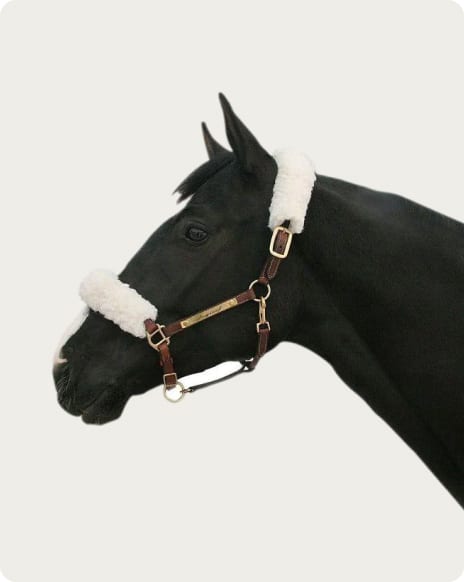
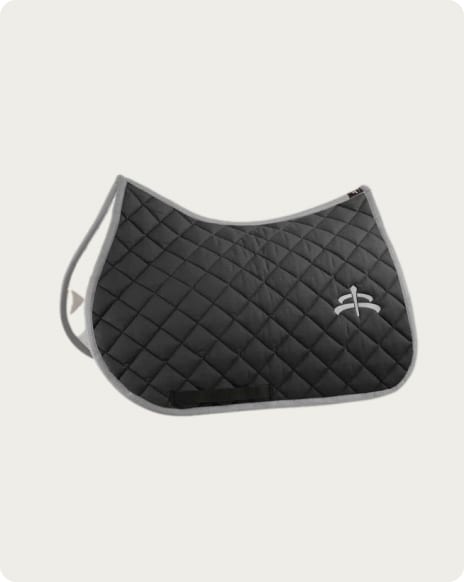
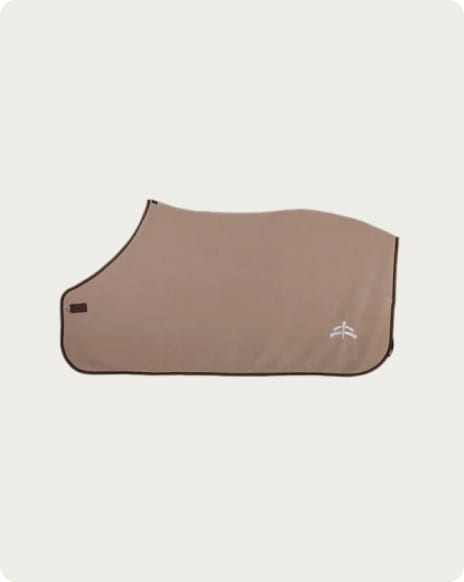
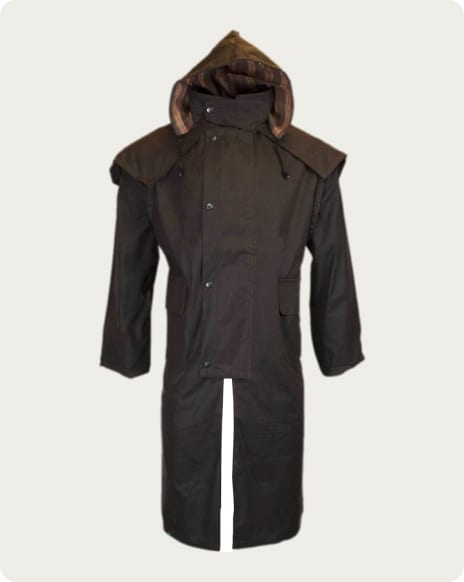
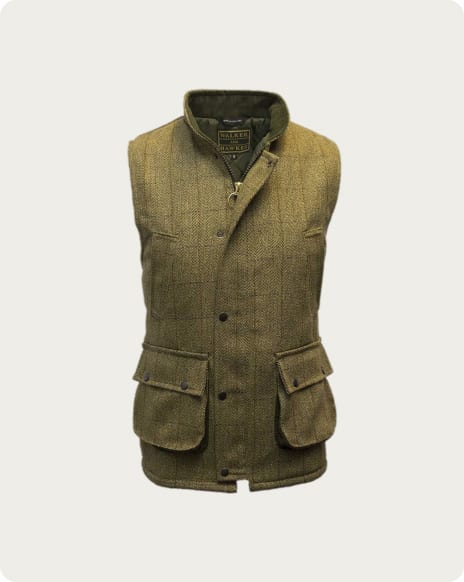
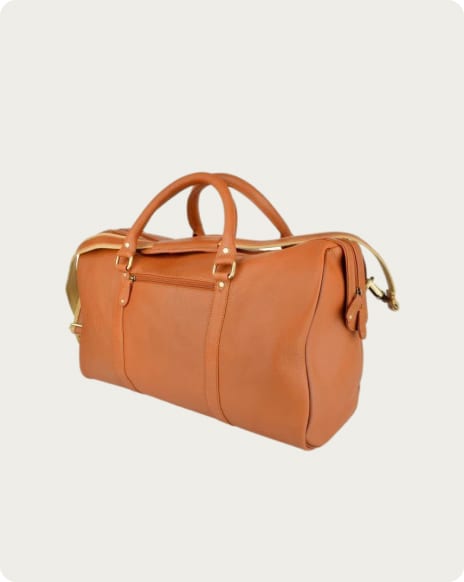
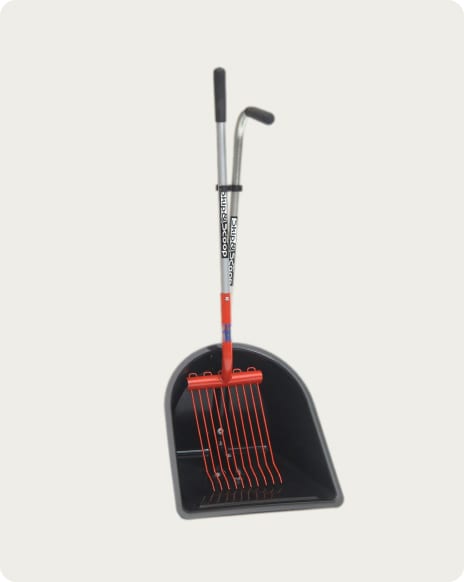
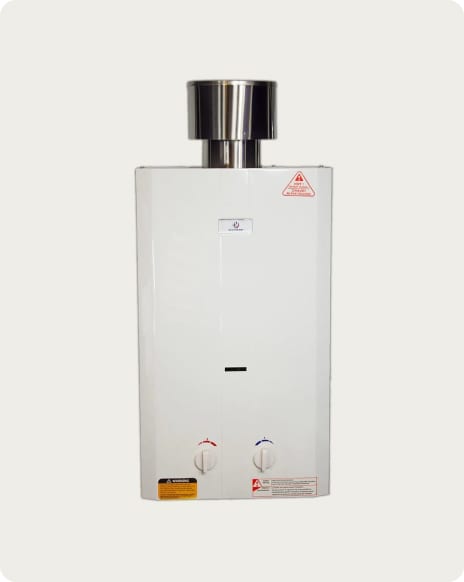
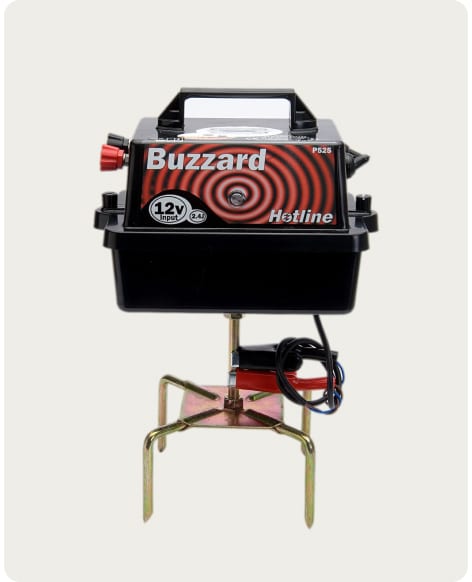
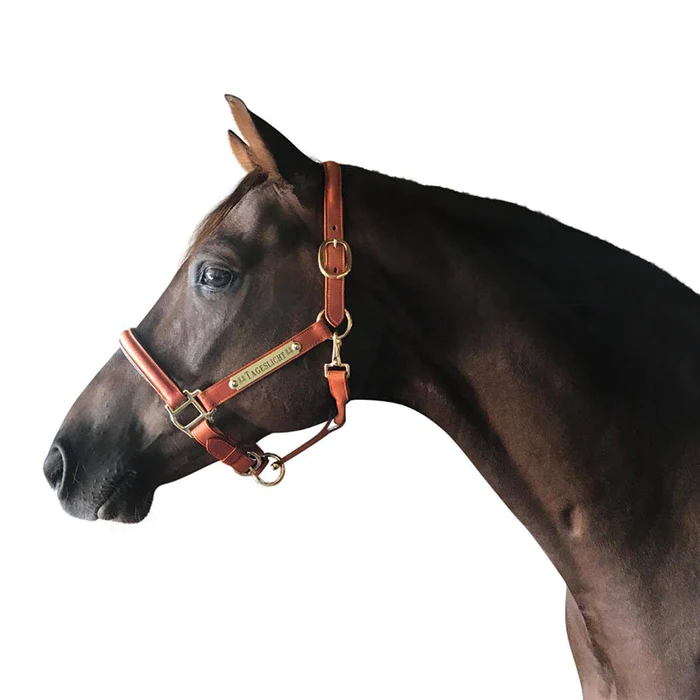
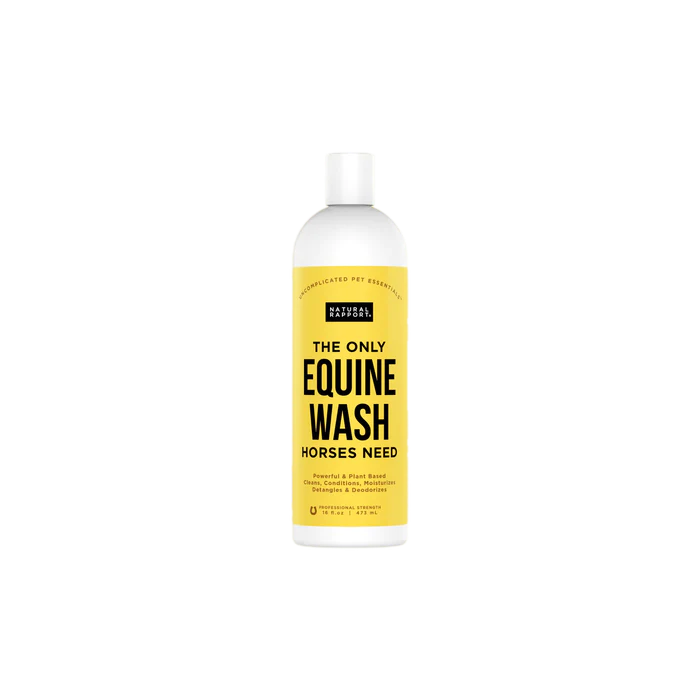
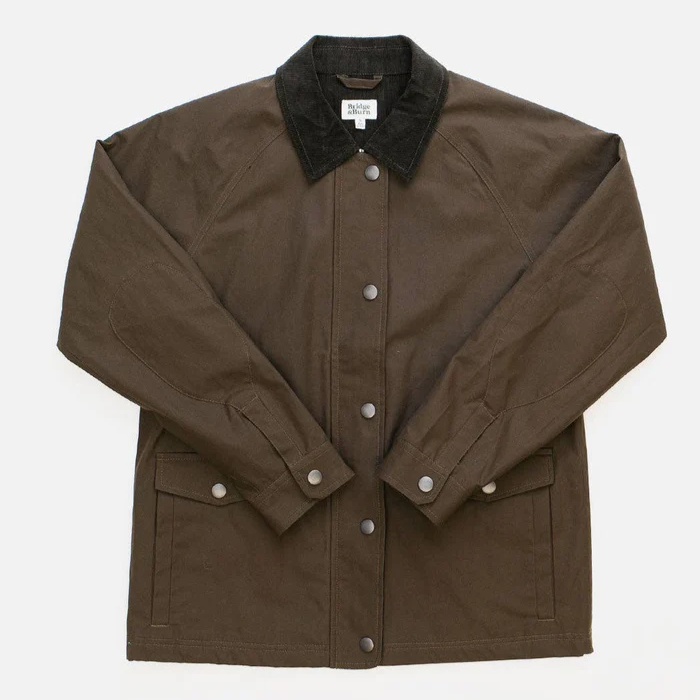
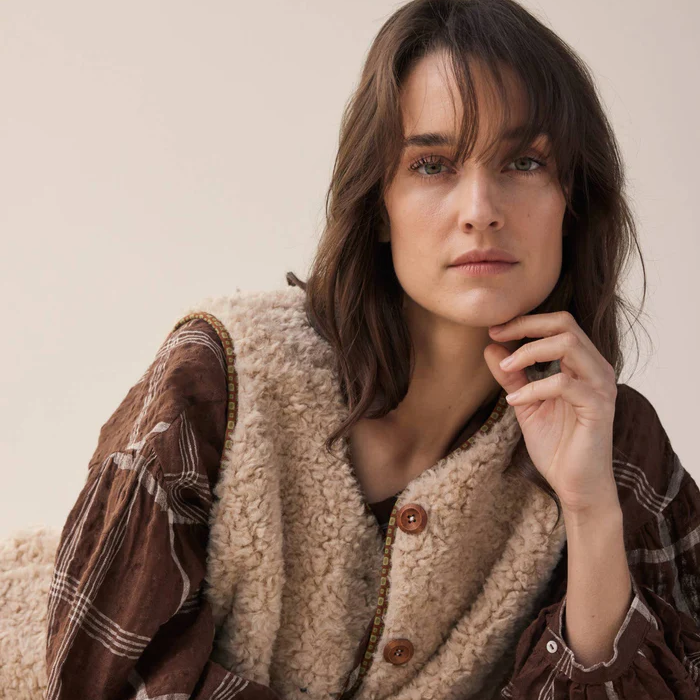
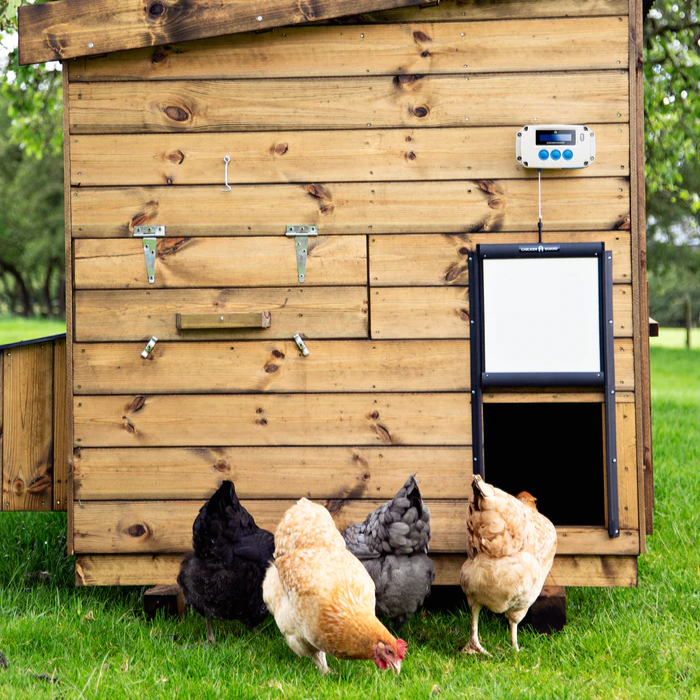


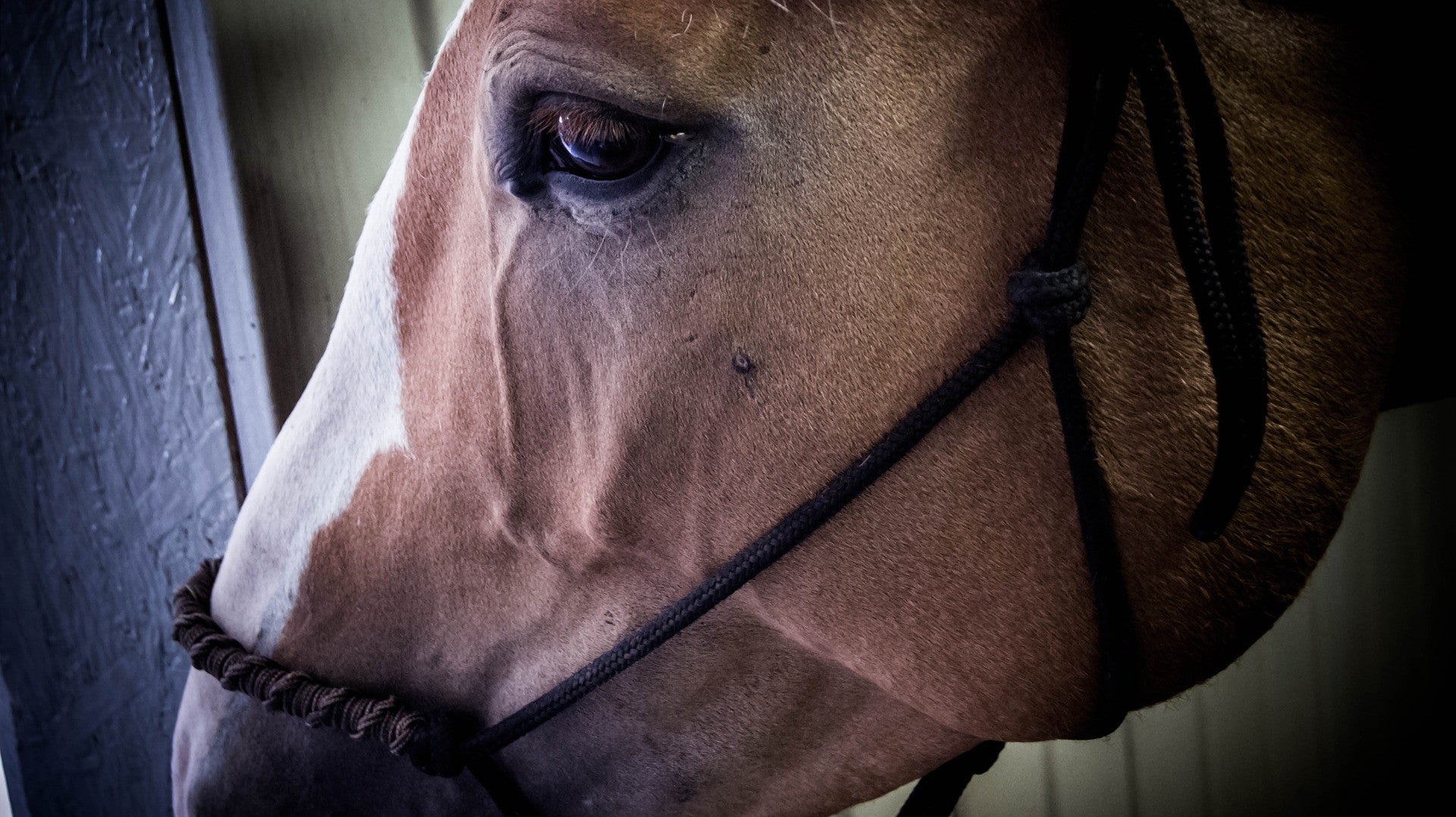
6 comments
Ali Ceesay
My little horse started eating her mum poop is just 12 days old baby. Secondly the mother didn’t have enough milk for the baby. What can i do now
My little horse started eating her mum poop is just 12 days old baby. Secondly the mother didn’t have enough milk for the baby. What can i do now
Ali Ceesay
My little horse started eating her mum poop is just 12 days old baby. Secondly the mother didn’t have enough milk for the baby
My little horse started eating her mum poop is just 12 days old baby. Secondly the mother didn’t have enough milk for the baby
Johannes Meijer
the horse from my neighbor comes about three times a day to my fence asking for food…. I feed him a banana, apple or carrots. Sometimes he comes to me with his shit all over his mouth… I am not sure what he gets from his caretaker, but I see him just once a day. he also has often wet slime in the corner of his eyes.. with flies bugging him majorly… last night he run of to the other side of the compound and hung right by my bedroom window… I think he was hungry and fed him two bananas and a carrot…. Just start loving the horse…
the horse from my neighbor comes about three times a day to my fence asking for food…. I feed him a banana, apple or carrots. Sometimes he comes to me with his shit all over his mouth… I am not sure what he gets from his caretaker, but I see him just once a day. he also has often wet slime in the corner of his eyes.. with flies bugging him majorly… last night he run of to the other side of the compound and hung right by my bedroom window… I think he was hungry and fed him two bananas and a carrot…. Just start loving the horse…
Kathy
I recently acquired a mini horse mare. She is nearly 4 years old. I bought her to be a companion to my quarter horse mare. They get along very well, but my mini is eating my big horses poo. She gets a small portion of grain, hay, mineral block and plenty of fresh water.
My vet has checked her teeth, no floating required.
I recently acquired a mini horse mare. She is nearly 4 years old. I bought her to be a companion to my quarter horse mare. They get along very well, but my mini is eating my big horses poo. She gets a small portion of grain, hay, mineral block and plenty of fresh water.
My vet has checked her teeth, no floating required.
Julie Allen
My mare has all you suggest and does that. Her hay bin isn’t empty inthe morning. Everything you suggest is covered other than getting bored. She’s out in 3 acres during day.
My mare has all you suggest and does that. Her hay bin isn’t empty inthe morning. Everything you suggest is covered other than getting bored. She’s out in 3 acres during day.
Eve irez
Thank you your comments help a lot my horse is coming up for two she is a stabled horse but has a large paddock that she can run around with other horses it’s been so wet with snow rain bless her she can’t be put out so I caught her eating her poo now I no she’s stressed at last the weather is better now so she can get out long last ,,,,,,
Thank you your comments help a lot my horse is coming up for two she is a stabled horse but has a large paddock that she can run around with other horses it’s been so wet with snow rain bless her she can’t be put out so I caught her eating her poo now I no she’s stressed at last the weather is better now so she can get out long last ,,,,,,